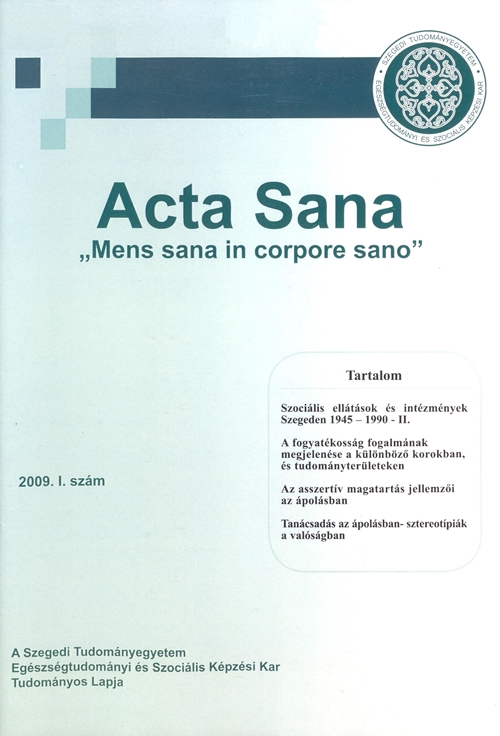Tanácsadás az ápolásban - sztereotípiák a valóságban
##plugins.themes.bootstrap3.article.main##
Absztrakt
The Act of Parliament number CLIV of 1997 stipulates that nurses must provide
patients/clients with counselling as part of their patient management. However
significant it is, only little research has been done on whether the conditions required
for counselling are fulfilled.
Thus the aim of this research was to explore the effectiveness of the principles of
helping relationships and the counselling styles adopted by nurses, the results of which
can be used in the development of nurse training, too.
43 third-year regular students took part in the survey and the results were analysed in
2008.
The method of the research was the so called “Looking for Trap.”
First, we examined the effectiveness of the principles of helping relationships. 51.2%
of the student nurses define nursing in the traditional sense that is they want to help
patients without involving them in the process. The expectations of the patients’
activities can be assessed by using independence premises. The premises used in the
sample are incidental and vague; all the premises were fulfilled in 16.69% of the cases.
When analysing nursing attitudes with model situations, we found the occurrence of
restrictive patient management style had the highest proportion, 60.4%.
Conclusion: both the principles and the patient management styles are found to be full
of traditional stereotypes, which are still functioning in our reality and nurse training
has to participate in changing this.
patients/clients with counselling as part of their patient management. However
significant it is, only little research has been done on whether the conditions required
for counselling are fulfilled.
Thus the aim of this research was to explore the effectiveness of the principles of
helping relationships and the counselling styles adopted by nurses, the results of which
can be used in the development of nurse training, too.
43 third-year regular students took part in the survey and the results were analysed in
2008.
The method of the research was the so called “Looking for Trap.”
First, we examined the effectiveness of the principles of helping relationships. 51.2%
of the student nurses define nursing in the traditional sense that is they want to help
patients without involving them in the process. The expectations of the patients’
activities can be assessed by using independence premises. The premises used in the
sample are incidental and vague; all the premises were fulfilled in 16.69% of the cases.
When analysing nursing attitudes with model situations, we found the occurrence of
restrictive patient management style had the highest proportion, 60.4%.
Conclusion: both the principles and the patient management styles are found to be full
of traditional stereotypes, which are still functioning in our reality and nurse training
has to participate in changing this.
##plugins.themes.bootstrap3.article.details##
Hogyan kell idézni
Boros, Katalin Gyöngyi. 2009. „Tanácsadás Az ápolásban - sztereotípiák a valóságban”. Acta Sana 4 (1):29-32. https://ojs.bibl.u-szeged.hu/index.php/actasana/article/view/18402.
Folyóirat szám
Rovat
Cikkek

